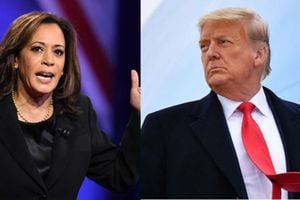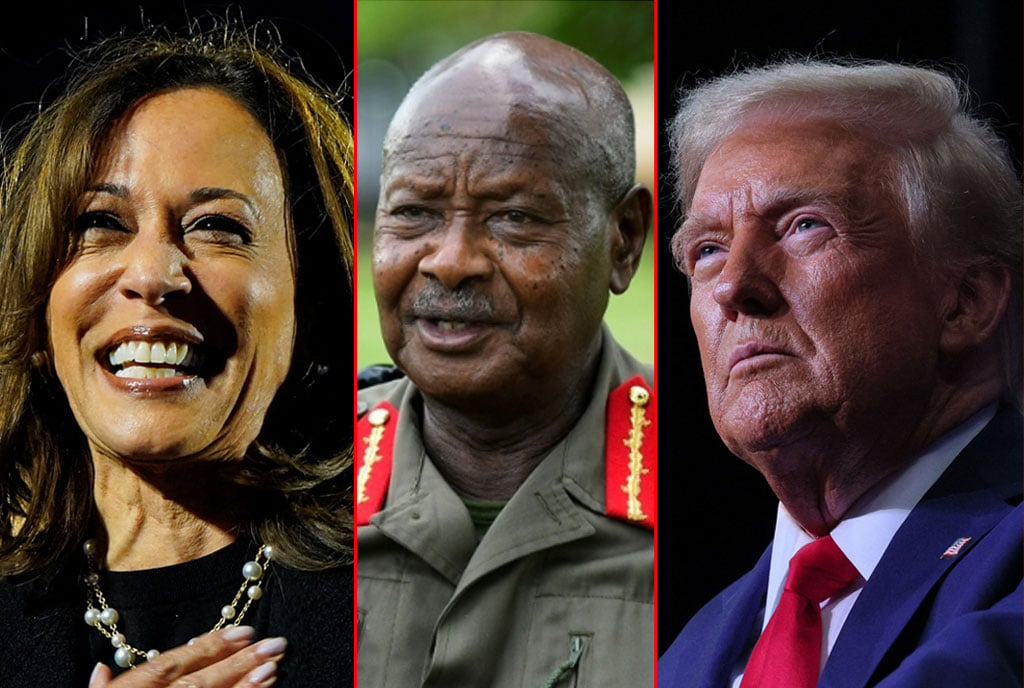
Democratic presidential nominee and U.S. Vice President Kamala Harris and Republican presidential nominee and former U.S. President Donald Trump are seen in a combination of file photographs taken in Chandler, Arizona, U.S., October 10, 2024 and in Evans, Georgia, U.S., October 4, 2024. PHOTO/REUTERS
A section of anti-corruption and governance experts yesterday said America’s support towards Uganda’s fight against corruption is likely to be relaxed should Republican Party candidate Donald Trump win the presidential polls, which end today.

L-R: Ugandan president Yoweri Museveni's daughter Natasha Karugire, President Museveni, US President Joe Biden and US First Lady Jill Biden pose for a photo at the White House on December 15, 2022.
Mr Trump is facing off in the polls with Ms Kamala Harris, the Democratic Party (DP) candidate, and the current Vice President.
Mr Trump, who won the 2016 polls after beating DP’s Hillary Clinton, was in 2020 defeated by DP’s Joe Biden who ended his bid for re-election mid-way after intense pressure following his poor showing in a presidential debate against Mr Trump to give way to his deputy Harris.
But as Americans choose between Mr Trump and Ms Harris, anti-corruption and governance experts in Uganda worry that Mr Trump is likely to ignore the war against graft.
They also fear that Mr Trump may roll back the Global Magnitsky Act as he did when he won the presidency in 2016.
Ms Sarah Birete, the executive director Centre for Constitutional Governance, said past experiences have shown that the Republican Party leaders do not deeply care about global accountability and human rights unlike their counterparts in the Democratic Party.
“If Kamala Harris wins, there will be an increasing push towards democracy, human rights, and the fight against corruption, especially under the Global Magnitsky Act. If Trump wins, the act will be pushed to the background like he did under his first presidency,” she said.
The official website of the U.S. Department of State, states that the Global Magnitsky Act of 2016 within the National Defence Authorisation Act (NDAA), 2017, authorised the US government to sanction those foreign government officials worldwide that are human rights offenders, freeze their assets, and ban them from entering the U.S.
The sanctions mainly target systemic corruption and human rights abuse, including the networks that engage in, facilitate, or perpetuate sustained patterns of such illicit behavior.
Under Mr Biden and his Vice President Harris, a section of Ugandan public officials have been sanctioned under this Act.
The Speaker of Parliament, Ms Anita Among, alongside seven other officials, were on May 30 barred from entering the United States of America over alleged “significant corruption and gross violations," of human rights.
The other officials included Ms Among's husband Moses Magogo; Minister of State for Finance Amos Lugoloobi; former Minister of Karamoja Affairs Mary Goretti Kitutu; former Minister of State for Karamoja Affairs Agnes Nandutu; and former Deputy Chief of Defence Forces Maj Gen Peter Elwelu.

Combo (L-R): Speaker Anita Among, her husband Moses Magogo, former Deputy Chief of Defence Forces Lt Gen Peter Elwelu, former minister of state for Karamoja affairs Agness Nandutu, and Minister of State for Finance Amos Lugoloobi. Inset (R) is the former minister of Karamoja affairs. PHOTOS/ FILE
The US Department of State also sanctioned Ms Kitutu’s spouse Michael George Kitutu; and Lugoloobi’s spouse Evelyne Nakimera. Mr Magogo, Mr Kitutu, and Nakimera were sanctioned because of the alleged actions of their spouses.
“Speaker of Parliament Anita Among is designated due to involvement in significant corruption tied to her leadership of Uganda’s Parliament,” the Department spokesperson, Matthew Miller claimed in the May 30 statement.
Four months after these sanctions, the US again slapped a travel ban on four officers of the Uganda Police Force (UPF) on allegations of gross violation of human rights, including torture and cruel, inhuman, or degrading treatment and punishment in October.
The officers were Bob Kagarura, the former Wamala Regional Police commander, and Alex Mwine, former Mityana District Police Commander, Elly Womanya, who at the time of the alleged human rights violation was Senior Commissioner and Deputy Director of UPF's Criminal Investigations Division in charge of the Special Investigations Unit (SIU), and Hamdani Twesigye, previously Deputy Inspector of Police assigned to the SIU.
The activists yesterday said such actions might not be seen during the Trump reign because he is mainly focused on US internal affairs.
“I expect to see more sanctions on Uganda related to accountability whether Trump or Kamala Harris wins. If Harris wins, it will be a continuation of Biden's administration; with Trump, he has been more inward looking, mostly focusing on America and withdrawal from the global scene. So, if you want to see the continuation of sanctions, Kamala has to take the day,” Mr Marlon Agaba, the executive director of the Anti-Corruption Coalition Uganda (ACCU), said.
He added: “These decisions are always taken by the technical branch, Civil servants in the US government, because even before Biden we saw sanctions over human rights and we have seen the same in his government and we expect to see more accountability. I don't see anything changing with this election.”

In this file photo, then US President Donald Trump and First Lady Melania Trump (right) host Uganda's President Museveni and First Lady Janet Museveni at a welcome dinner also attended by other world leaders on September 20, 2017 on the sidelines of the UN General Assembly. PHOTO/FILE/HANDOUT
During the Trump era, Uganda witnessed a few sanctions when the US Treasury Department indicted former Inspector General of Police Gen Kale Kayihura on September 13, 2019, for reportedly engaging in corruption and human rights abuses.
The activists, on the whole, say the Democratic Party administration is tougher on corruption in foreign lands than the Republicans.
How electoral college works
The Electoral College is the process by which Americans elect their president and vice president indirectly through their state’s electors. Candidates must secure 270 electoral votes, a majority of the 538 at stake, in order to win the White House. Before the general election, states select slates of electors.
After voters cast their ballots in November, the candidate who wins the popular vote determines which slate of electors — Republican, Democrat or a third party — will cast electoral votes in the Electoral College for the president. In most states, it’s winner-take-all — whoever gets the most votes in the state wins all of its electoral votes. In Maine and Nebraska, the rules are slightly different.
They have a proportional representation system in which the winner of each congressional district is awarded one electoral vote, and the winner of the statewide vote is awarded each state’s remaining two electoral votes. Electors meet in their respective states in mid-December to cast their votes for the president. The meeting takes place the first Tuesday after the second Wednesday in December, which falls on December 17 this year. Each state is allocated electors based on the size of its congressional delegation.

Chocolate bars with the faces of Democratic presidential nominee U.S. Vice President Kamala Harris and Republican presidential nominee and former U.S. President Donald Trump are displayed at a store in John F. Kennedy International Airport, New York, U.S., October 25, 2024. PHOTO/REUTERS
Several states with the smallest populations — Alaska, Delaware, North Dakota, South Dakota, Vermont and Wyoming — have three electors each, since they have one representative in the House and two senators, while California, the largest, has 54 electoral votes. Washington, D.C, is also allocated three electors.
In the rare event that there’s a tie in the Electoral College — which in the modern era would mean each candidate wins 269 electoral votes — members of the newly elected House of Representatives would decide the outcome of the presidential election, while the Senate would select the vice president.
Source:CBS news




